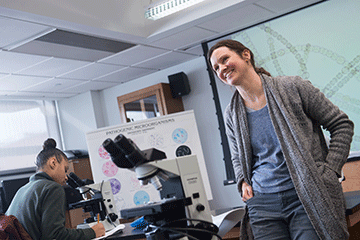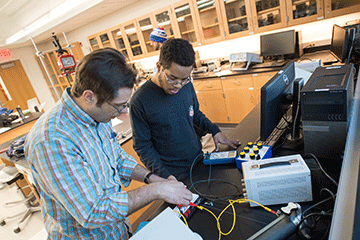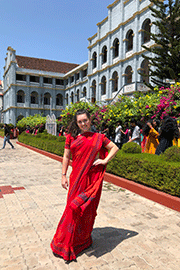
11/03/2020
The science, technology, engineering and mathematics (STEM) professions are among the fastest-growing and most promising career fields in the United States.
However, STEM is severely lacking diversity and inclusion. Why is that?
SUNY Cortland senior Hannah Fitzgerald of Albany, N.Y., a biomedical sciences major with a chemistry minor, has explored possible explanations that she shared on Thursday, Nov. 5 in a virtual presentation attended by about 100 faculty, staff and students.

“There’s a lot of gatekeeping in academia: who you know as an applicant, determining if you’re really qualified, not just from your research, degrees and recommendation,” said Fitzgerald, who also is an R.A. in DeGroat Hall and a programming intern this semester with the Multicultural Life and Diversity Office. “Academia isn’t all bad but there are a lot of doors.”
The aspiring physician worked with SUNY Cortland faculty on the Biological Sciences Department’s Diversity, Equity, and Inclusion Committee (BIO-DEI) to design the presentation she gave on some of the possible reasons for inequality in STEM.
Titled “Racism and Bias in Science, Technology, Engineering and Mathematics,” Fitzgerald’s presentation was via Zoom with questions shared through Zoom chat.
Fitzgerald focused her presentation on the implicit and explicit bias often experienced by underrepresented students in STEM disciplines. The causes of bias and inequality in STEM range from systematic racism to a history of sexism, according to Fitzgerald, who has gleaned from the collaborators on the BIO-DEI committee and MLDO.
“Honestly, being involved in higher education, I realize that it really starts from the ground up,” Fitzgerald said.
That begins with having the opportunity for an excellent primary and secondary education.
“If it’s not always there, the encouragement and the resources, some people can fall through the cracks,” she said.
As a first-generation American whose parents immigrated from Ireland, and who is a recipient of the university’s John Fantauzzi Scholarship, aimed at more recent U.S. citizens, Fitzgerald said she had a great high school education but felt the student body lacked diversity.

“There is culture of racism in Ireland but my parents taught me to respect other cultures,” she said.
Fitzgerald sought that inclusive experience upon joining SUNY Cortland.
“My high school was not as diverse as Cortland, and Cortland to some people is not very diverse at all,” she said.
“I love my major but my only opportunity for these diverse experiences has come with being an R.A.,” she said.
So she worked with MLDO to create an internship where she can develop programming to enhance inclusion on her campus. Fitzgerald also experiences multiculturalism as an R.A. who engages with many diverse student organizations. A world traveler to India, she also has advanced her scholarship there as a clinical observation intern in biomedicine.
“If I wasn’t involved with a lot of things on campus, I don’t think I would be as educated. For me, this is kind of taking the first steps to becoming educated, and just enhancing my life experience in general.”
For more information, contact multicultural.life@cortland.edu or visit the Multicultural Life and Diversity Office website.